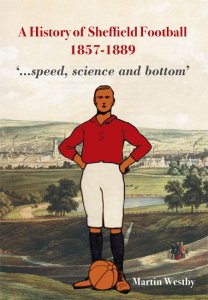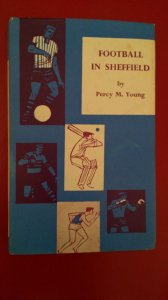Harry Thickett
New Member
- Joined
- May 3, 2012
- Messages
- 55
- Reaction score
- 177
I have written a book covering the period when the world’s first football club, Sheffield FC, began in 1857 upto the foundation of Sheffield United in 1889 and the other 93 football clubs that existed in Sheffield in between.
We are all Blades on this forum, but we need to remember that besides our tribal conflicts, Sheffield is the home of football and has an amazing story to tell about the beginning of our national game. If our footballing heritage had happened in any other place, like Manchester or London, we would never had heard the end of the subject with dedicated museums and books, yet in Sheffield we barely mention the subject.
Association football began in Sheffield and was the centre of early world football for over 25 years until professionalism took over the amateur game. Sheffield also had a massive influence over the formulation of the Laws of the game. Sheffield had a rule book in 1858, five years before the Football Association came up with their version and actively lobbied the London meetings in 1863 to ensure that the Laws did not include running with the ball in your hands nor hacking.
The game continued to thrive in Sheffield after 1863 but the FA struggled to engage enough clubs to play by their laws. Without the intervention of William Chesterman of the Sheffield Football Association in 1867, the London F.A. would have voted to dissolve. He enrolled 16 Sheffield clubs and 1,000 players at the crucial time to save the London organisation.
There is more information about the book here together with some reviews:
http://www.englandsoldestfootballcl...-football-1857-1889-speed-science-and-bottom/

If you decide to order, enter ‘football’ as a coupon code when prompted and you will receive a 10% discount off the usual RRP of £15.95. There is also an online option to add a dedication if you want the book to be a gift.
I am donating 10% of the book proceeds to Prostate Cancer UK.
We are all Blades on this forum, but we need to remember that besides our tribal conflicts, Sheffield is the home of football and has an amazing story to tell about the beginning of our national game. If our footballing heritage had happened in any other place, like Manchester or London, we would never had heard the end of the subject with dedicated museums and books, yet in Sheffield we barely mention the subject.
Association football began in Sheffield and was the centre of early world football for over 25 years until professionalism took over the amateur game. Sheffield also had a massive influence over the formulation of the Laws of the game. Sheffield had a rule book in 1858, five years before the Football Association came up with their version and actively lobbied the London meetings in 1863 to ensure that the Laws did not include running with the ball in your hands nor hacking.
The game continued to thrive in Sheffield after 1863 but the FA struggled to engage enough clubs to play by their laws. Without the intervention of William Chesterman of the Sheffield Football Association in 1867, the London F.A. would have voted to dissolve. He enrolled 16 Sheffield clubs and 1,000 players at the crucial time to save the London organisation.
There is more information about the book here together with some reviews:
http://www.englandsoldestfootballcl...-football-1857-1889-speed-science-and-bottom/

If you decide to order, enter ‘football’ as a coupon code when prompted and you will receive a 10% discount off the usual RRP of £15.95. There is also an online option to add a dedication if you want the book to be a gift.
I am donating 10% of the book proceeds to Prostate Cancer UK.

